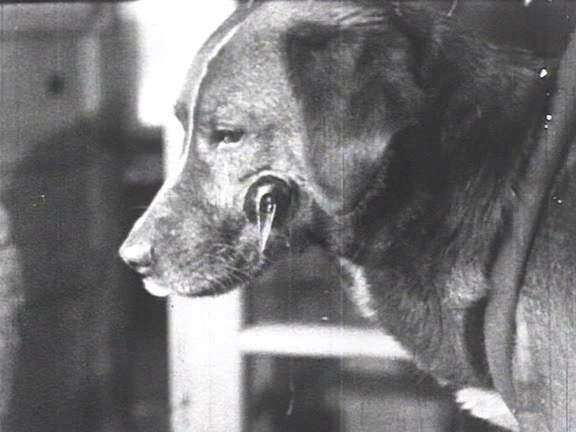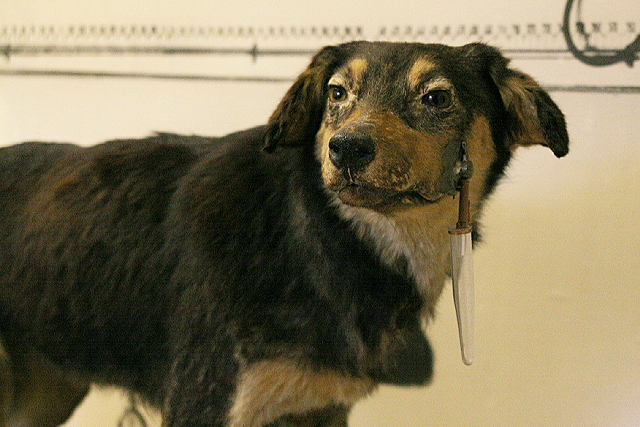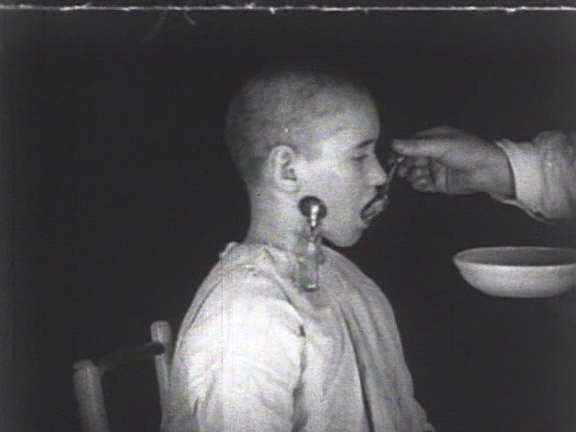[Warning: Disturbing Pseudo-science Medical Experiments]
Pavlov’s apparatus sounded suspiciously sketchy, to me. Maybe that’s because I’ve gotten used to measuring things like a machinist: “15 drops” is not precise enough, I’d expect accurate measures to 1/10,000th of a drop. The illustrations we see of “Pavlov’s Dogs” are an approximation, but there’s already too much hose and surface; you’d lose a couple drops (at least) and I don’t think that the difference between unstimulated dog drool quantity and stimulated dog drool quantity is going to be dramatic.
Searching for “Pavlov apparatus” turned up plenty of illustrations, but few photos. I have to admit that immediately made me suspicious – I’d expect that if the apparatus was not cobbled-together crap, there would be lovely photos of it. Cameras existed back then and I’d be surprised if any legitimate experimenter would feel it necessary to conceal their gear. I love doing internet searches, so I thought I’d see if I could find some good pictures of Pavlov’s gear. I found some good pictures and more, pulled together [info].
 I assume Pavlov never went to a dentist. Here’s an experiment: put a toothbrush in your mouth, with end of it between your cheek and your gums. Leave it there for a while. Make a rough assessment of how much you drool with an object in your mouth, as opposed to normal. Now, imagine you’ve got a hole in your cheek and some apparatus is shoved through that hole into your mouth.
I assume Pavlov never went to a dentist. Here’s an experiment: put a toothbrush in your mouth, with end of it between your cheek and your gums. Leave it there for a while. Make a rough assessment of how much you drool with an object in your mouth, as opposed to normal. Now, imagine you’ve got a hole in your cheek and some apparatus is shoved through that hole into your mouth.
One of the first rules of measuring apparatus is that the apparatus should not interfere too much with the thing being measured. Because, then, what are you measuring? First question: do dogs drool symmetrically when they have a hole in their face?
Sure, Pavlov was one of the primitive forefathers of psychology, but: this is hackwork.
Also, what did it demonstrate? Learning. Whoah, never saw that one coming. Animals can learn. Presumably Pavlov never gave a horse a good brush-down then asked it to perform. Or played with a dog, for that matter. Dogs will come to you (and listen to you) if you give them bacon. I experimented on several dogs and determined this. What did Pavlov’s famous experiment determine, that there are learned behaviors?

stuffed memorabilia of one of Pavlov’s victims dogs at the Pavlov museum
This is really sketchy stuff, so far, but Pavlov was only getting started.

Now I have to call “bullshit” again: how are you measuring saliva when you’re feeding a kid gruel or whatever that is? This is not demonstrating a learned response to a stimulus. It’s just pseudo-science and sadism masquerading as science. Just in case you thought Zimbardo’s Stanford Prison Experiment was as bad as psychology gets, this will cure you.

There’s a movie of Pavlov’s cabinet of curiousities, entitled: Mechanics of The Brain (1926) – by the time Pavlov was an important, senior science figure in Russia, he had his own laboratory at the Leningrad Medical Institute. The experiments on children were performed by Professor Krasnogorskii of the Institute.

“as bad as psychology gets” – we could have a cheerful debate about that topic. My candidate would be when Sigmund Freud devised a theory that the shape of a person’s nose affected their attitude, so he performed an amateur nose-shape-adjustment (I won’t call it a “rhinoplasty” because plastic surgeons, in theory, know what they are trying to accomplish) on a young lady who was unhappy. It turned out that having a shorter, bobbed nose, didn’t make her feel better, especially when infection ensued and she wound up disfigured and massively scarred. Freud managed to bury the incident fairly well. I suppose that it marks a low-point in the founder of psychology’s career, so everything afterwards was definitely a significant improvement.
The invention of frontal lobotomies, and the 50,000 or so patients who had their brains altered with an ice-pick, would be another low-point for psychology. Or do we blame the psychiatrists for that one? If it was the psychiatrists, they got the idea from psychologists, so score them both a big black mark for that one.
Link to the 1926 film: (according to wikipedia, it was Russia’s first science documentary)

I never did understand why Pavlov felt such experiments were necessary. Of course animals can learn and anticipate and everyone knows that drool happens with dogs when food is involved. And they knew it back then too. Let’s see…farm dogs, carrier pigeons, steeplechase horses, fox hunting dogs, herding dogs, pet dogs.
And those kids…jesus but it all looks like torture.
As for Freud, his “work” on hysteria in women turned me away early on. I told a TA once it sounded like sexual assault and I got some song and dance about “research” and “times were different.”
I’m curious about your thoughts on personality testing and the validity of the MMPI.
Between your fond callback to lobotomies and all that footage of frogs twitching* I’m beginning to think that any suspected breakthrough – particularly those involving living things – should be mulled over for a few decades before being actually put to use.
“I think we could really help people if we scrambled their brains. It would make people who are feeling troubled feel … different.” – “What a novel and interesting idea! Let’s think that one through and debate the pros and cons for thirty years. Can anybody think of any reason not to do this? Oh, that’s a lot of raised hands…”
As for Pavlov, whether his famous experiment was great or not, he certainly did science no favours later in life. As one of the scientific minds of the still-young Soviet Union – world reknown, no less – his word was law. Either your beliefs and science would fit with his opinions or your own career might start hitting snags. The Soviets – the ones in charge anyway – were very keen on science, but they were even more eager to build their reputation abroad, so anyone who managed to make a name for themselves internationally and agreed with the party line was bascially treated to sainthood.
Woe betide the blasphemers with different ideas. No funding, exclusion from the acadamy of sciences, no employment, not being allowed to even communicate with the international community (getting foreign publications was always difficult anyway) and a hundred other ways to make your life difficult. In lieu of carrots the Soviet Union had a lot of sticks to offer. Especially so in the 20s and 30s with civil war, famine and general strife making life hard enough already.
*I’ll finish watching it later. Maybe……
komarov@#2:
Perhaps thirty years is a bit extreme. I think any IRB would have denied ice-pick lobotomies in about ten seconds flat — and quite a few other “research” and “treatment” atrocities too. But yes, we could use more scrutiny even today, if done honestly and competently.
You are right about the Soviet Union (and the Eastern Bloc in general). They were self-destructively deferential to authority figures of their own making, often selected based on small, isolated successes, regardless of their subsequent record (Trofim Lysenko comes to mind. “This guy who once did a really impressive science fair project says this one weird trick will improve wheat yields by 20%! Let’s try it on all our food at the same time!”). It’s as if the Soviet were desperate to close the sacred-cow gap between them and the West. Present-day “influencers”, eat your hearts out.
I think you’ve still got the wrong idea of what he did. He wasn’t vacuuming up saliva from inside the mouth like when the dentist does that (except through your mouth instead of your cheek). He externalized the opening of the salivary duct so that it dumped saliva into his collection apparatus (glued to the dog’s face) instead of into the mouth. So feeding doesn’t interfere with that collection.
So while I agree that the experiments themselves were pretty pointless, I don’t think the methodology is as suspect (from a practical rather than ethical pov) as you do. What I’ll now be haunted by is wondering where he got those children…
ridana@#4:
I think you’ve still got the wrong idea of what he did. He wasn’t vacuuming up saliva from inside the mouth like when the dentist does that (except through your mouth instead of your cheek). He externalized the opening of the salivary duct so that it dumped saliva into his collection apparatus (glued to the dog’s face) instead of into the mouth. So feeding doesn’t interfere with that collection.
Ohhhhhhhh…. Thanks for explaining that. That also explains away the problem of lopsided collection.
I wonder if he used the same method on the kid, and whether they bothered to repair the kid afterwards. “Hey, you’ll be able to measure your saliva production from now on! Don’t thank us.”
voyager@#1:
I’m curious about your thoughts on personality testing and the validity of the MMPI.
It’s complicated and would require enough explanation that I probably should just do an entire post on the topic.
I’ve done MMPI three times (when I was an undergrad) and it was a life-changing experience because it made me really think hard about what testing means and why we test, in general. From where I sit, I am mostly puzzled by tests.
komarov@#2:
“I think we could really help people if we scrambled their brains. It would make people who are feeling troubled feel … different.” – “What a novel and interesting idea!
I don’t know if you know this, but it was … even more novel and interesting than that.
Doctor 1: “OK, here’s this guy who was a railroad worker, who was apparently a mean and tough cuss, but one day he had an accident tamping a blasting-charge into a hole and the charge went off and blew the tamping-rod (a 2 meter long piece of steel about 24mm in diameter) through his skull, demolishing the frontal region of his brain. He survived, incredibly, and afterwards was a changed man: he was gentle and mellow and maybe we should do that to other people.”
Doctor 2: “You mean, we should make a machine that explodes steel rods through people’s heads?”
Doctor 1: “Yes, but gently.”
When you’re a psych undergrad you may experience a psychology professor telling you the tale of Phineas Gage, as if it was an interesting experiment, not a horrible sadistic deviation into pseudo-science that affected hundreds of thousands of lives. (Those people who got lobotomies had families)
The Soviets – the ones in charge anyway – were very keen on science, but they were even more eager to build their reputation abroad, so anyone who managed to make a name for themselves internationally and agreed with the party line was bascially treated to sainthood.
I know that a lot of people here think I am unfairly critical of psychology, but I was trying to be nice and deliberately did not link Pavlov with Lysenko. The linkage to state-sponsored pseudo-science is pretty hard to miss, though. Lysenko was responsible for more harmed lives than all of psychology, ever, so: yay, psychology.
Yes, I’m familiar with Phineas Gage and it’s part of the reason for my deliberately excessive thirty year timetable. Over the course of history we’ve had a lot of phenomenally stupid ideas that must have seemed absolutely fantastic at the time. Otherwise they’d never have been tried.
Neuroscrambology may be an obvious idea to shoot down but there were a lot of terrible ideas where people did a lot of “deep thinking” and still failed to grasp just how awful they were. Eugenics spring to mind, more or less at random. That’s an idea that has literally shaped history and, in spite of everything, still shambles on today.
—
Psychology – heavily intermingled with what I’d guess might be philosophy – was the big scientific breakthrough of the time. As a field of study it was practically tailor-made for the Soviet Union as the regime was trying to understand and justify itself and its departure from authoritarian and capitalist tradition. (At least according to the regime) A new nation with an entirely new society that needed to ground itself in science. That need may have been exacerbated by the revolution and civil war. Years of massacres and bloody uprisings weren’t how it was meant to go and desperately needed to be explained away or glossed over. “The wrong people grabbed power first time round” just didn’t cut it in a classless society of equal workers.
Nevertheless, I think the USSR was recognised as a world leader in the field. Science certainly contributed a lot introducing the Union to the world stage and even fostered some genuine enthusiam (in some quarters) for this new nation.
Pavlov and Lysenko are perfect examples for this thread. Lysenko certainly was a vindictive fellow* who jealously guarded his high standing against dissenters and other threats. I’m less certain about Pavlov though.
My impression of him was that his early success went to his head and he started to believe in his own greatness when he might have known better. The end result may be the same – an authoritarian imposing his will on what should be free inquiry – but it gives his story some sad undertones. (Mind you, I’m not saying that any amount of “it might have been” makes anything better)
*I’m trying to be nice, too.
@ 6 Marus
I’ve done MMPI three times (when I was an undergrad)
What the devil for? You were locked up in a maximum security psychiatric hospital and the authorities were trying to see if you should plead not guilty by virtue of insanity for that series of murders?
That thing was never intended for use on a normal population–assuming undergraduates are ‘normal”. It was basically designed for use with a psychiatric population. I once saw a set of MMPI profiles from maximum security psychiatric hospital and it was picking up the shear madness enough that those profiles were scary. So for an extreme and very dangerous it seems to have had some validity. For less disturbed patients it may or may not be particularly valid.
@ 1 Voyager
Re personality testing in general—I doubt that Marcus will agree –, the last time I look and it was a long time ago, the entire area was a kind of dog’s breakfast with some tests probably having some validity and others such as the Myers-Briggs Type Indicator (MBTI) being total garbage and I am being kind. On the other hand, Bob Altemeyer’s Right Wing Authoritarian Scale seems well-built with good internal reliabilities and decent predictive validity. I doubt though that Bob would call his scales “personality” scales for a number of theoretical and practical reasons.
In the last 20 or 30 years there has been a revolution in personality theory that I have not been following but the advent of the Big Five Personality Traits theory seems to have revolutionized personality theory and practice so maybe some of the really bad crap will be dropped. Not that everyone agrees with the Big Five but some of weirder theories seem be being dropped by psychologists. Non-psychologists will continue to use absolute garbage like the MBTI.
@ 8 komarov
Nevertheless, I think the USSR was recognised as a world leader in the field.
Depends on what area of psychology but certainly there were some famous names in the USSR. It has been a long time since I was reading in those area so the only names I can remember is Alexander Luria and Lev Vigotsky as I was reading them in the context of language acquisition which I was quite interested in as an undergrad.
We in the West have often suspected that we were missing a lot of outstanding research as Soviet researchers published in Russian and we lacked Russian-speaking psychologists or Russian-to-English psychological translators to provide us with translated papers, etc.